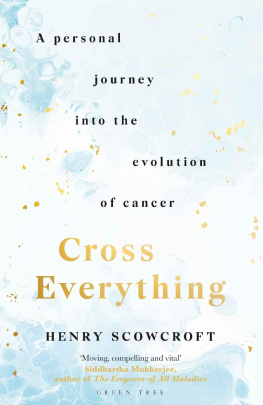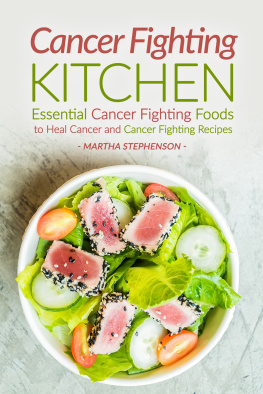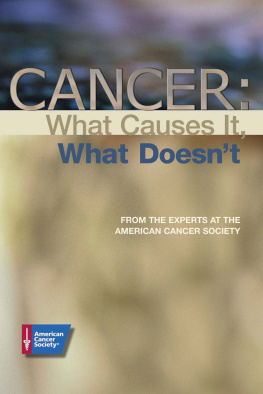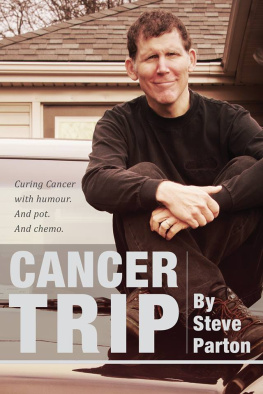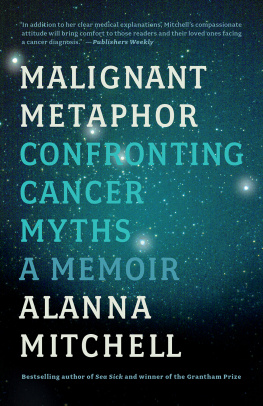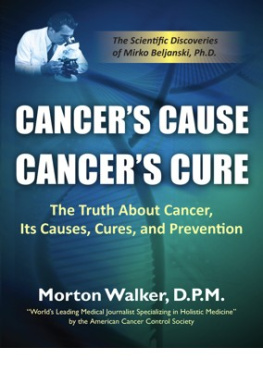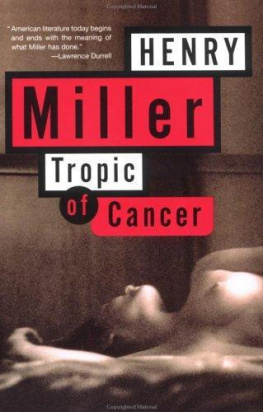
For everyone who has ever lost anyone to cancer;
and to everyone who is living with cancer right now.

Contents
Although this is a book I never wanted to have to write, Ive always loved writing. One of my earliest memories is of posing for a photo for our local newspaper, after winning the 10 prize in a writing competition run by the local library. A decade later, as a biochemistry student, I remember sitting in an intense, cramped tutorial, my tutors face a picture of bemusement at my latest attempt to crowbar alliteration and assonance into dry academic essays on mitochondrial respiration or bacterial cell division.
But it never occurred to me, back then, that Id end up as a writer. Instead, Id chosen to study science thanks to a natural, deep-seated (and occasionally annoying) curiosity about the world around me, inspired by my grandfather, a professor of botany. Id had aspirations to follow his footsteps into a career in research. But over the course of my degree, as I left behind a string of failed experiments, partially contaminated laboratories and broken glassware, it turned out that writing was by far my strongest suit, and where my future lay. It probably helped that my mother has been, for more years than I can remember, a gardening columnist for a national newspaper, with a quite wonderful turn of phrase. And while she never directly encouraged me into a career in writing, the joy and pride she so obviously takes in wrangling words into her weekly column must have provided some sort of inspiration, even if indirect.
Eventually, it was the urge to marry my two passions to explain science through the written word that led me to study for a post-graduate degree in science communication, and which subsequently propelled me into a job as a science writer at a charity: Cancer Research UK, a large, well-loved medical research organisation, headquartered in London. But back then, despite the organisations long and impressive history a 100-year-old cancer research charity, the largest in the world I had no special affinity for or connection with cancer. It was, simply, my first proper job, and one in which I was determined to make a reputation for myself, as someone who could help people engage with and understand the scientific research that had so fascinated me at university.
And so, from the early 2000s until the mid-2010s, I earnestly bashed out a constant stream of articles for the charitys website, on a blogging platform that I and a couple of colleagues set up and managed. As the years went on, they both left the charity to pursue careers as science writers. Both are now published authors in their own right; I always doubted I had a book in me, and was content to keep on churning out articles about pretty much every aspect of cancer for the charitys supporters and the wider public, safe in the knowledge that I was probably doing some good in the process.
But that all changed in 2016, when my girlfriend, Zarah, was diagnosed with incurable bladder cancer. Suddenly, out of the blue, my relationship with the disease became personal as well as professional.
One particular memory sticks out, shortly after Zarahs diagnosis. A corridor, and an earnest conversation with a colleague who had survived breast cancer years previously a gruelling experience, which had had a profound effect on her. Its going to be a really rough ride. Find something you love doing, and make time to do it. Itll keep you sane. You obviously love writing maybe write your way through it?
I took her advice to heart. Id already assumed the mantle of keeping our wider network abreast of Zarahs travails via a series of regular emails. As her disease progressed, writing these became a sort of therapy a way to order the chaos of cancer into something we could cope with, and to use the skills Id honed over the years writing for Cancer Research UK to reassure, explain, and contextualise Zarahs plight for the many who were deeply concerned about her. Quite frequently to her occasional frustration Id stay up till the small hours, getting the text just right , trying to convey our hopefulness and stoicism, explain what might happen next, what the options were. And in the course of those emails, one phrase kept coming up again and again a plaintive imperative, addressed to the emails recipients and their inevitable offers of help and support:
Cross everything.
As I was to realise, its a phrase that conveys much about the reality of a cancer diagnosis something that no amount of blogging about dry academic research papers can teach you. Will the treatment work? What will the scans show? Can we go on holiday? What can I do?
Zarah and I often talked about writing a book about her experience, and thats one for The Book became a bit of an in-joke between us, to be wheeled out in the face of some of the more ludicrous episodes we faced.
We never discussed whod actually write it. It turned out that it was a job that would fall to me alone.
In the aftermath of her death, several people remarked to me that I really should do something with those emails. The missives had, it transpired, very much hit the mark, revealing to their recipients much about cancer that theyd not known before: the daily grind of the diseases tragic ebb and flow, but also thanks to the medical and scientific insight I felt necessary to include something of cancers underlying nature that many had found helpful. The juxtaposition of the science with the personal seemed vital in conveying both topics.
My decision about whether to adapt these emails, somehow, into a book was further influenced by a small legacy shed left, in the form of DNA analyses and tissue samples, saved on NHS servers or frozen in anonymous stasis in a freezer in the local hospital. Could these, I wondered, be drawn together to answer questions about her disease: how it originated, what fuelled its growth, and why it was so aggressive. Questions, I suspect, everyone affected by cancer has, but which I was, it seemed, in a position to at least try to answer. And so I set about trying to do so.
Working with researchers to answer these questions has, of course, been a journey of personal closure as much as the substrate for this book; but I hope the answers and what I learned about cancer along the way can crystallise, in the books readers, an understanding of cancer, and that this is, in some way, as helpful for people who read it as writing it has helped me.
So what youre about to read is, in essence, two interwoven stories.
On one hand, its the story of a tumour, told, as best I can, through careful analysis of Zarahs biological data and that of her cancer. One thing above all else that has fascinated me in all my years writing about cancer is the growing understanding of its evolutionary, Darwinian nature how, all too often, despite the best efforts of the doctors that treat it, it evolves, adapts, resists and survives. Far from being an inert, uniform ball of cells, researchers are discovering that tumours are dynamic, constantly adapting, ever-changing, battling with the bodys defences for supremacy and are starting to unpick the rules that allow them to do so. I hope the story of Zarahs tumour, and what Ive been able to learn about how it evolved, serves as a useful vessel through which to convey this modern view of cancer.
The other story is essentially human: a tale of the life and troubles of a remarkable, compassionate, hilarious, open-hearted woman; one that I hope Ive done justice to, and that bears proper testament to the joy she brought so many of us both before and after her diagnosis and the impact shes had on the lives of those who knew her.
Next page
